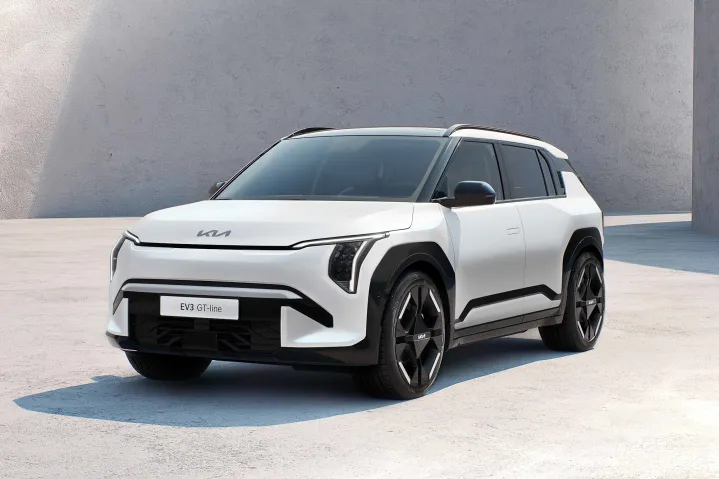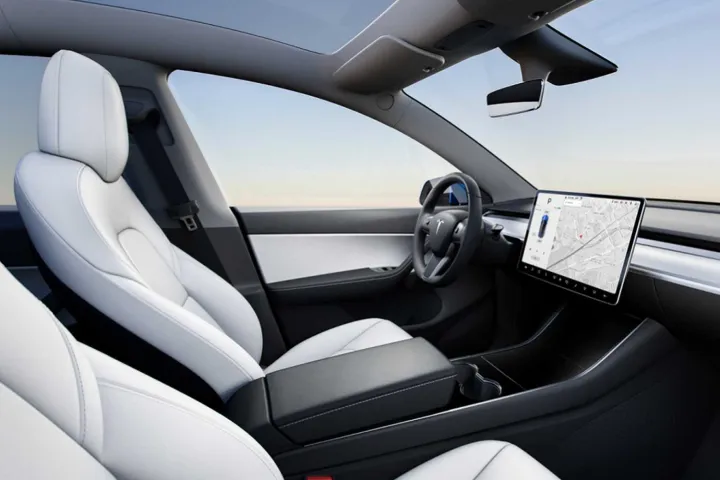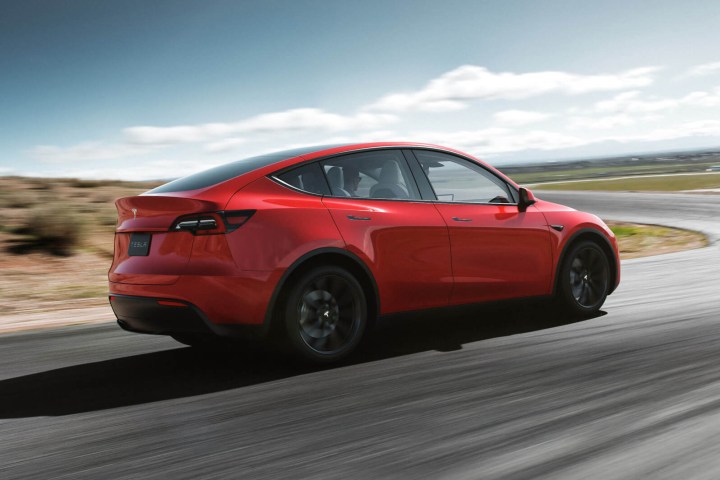
The Kia EV3 is finally coming, and it could well end up being the best small-size electric SUV to buy when it finally rolls out. It’s smaller than the Kia EV9, but it offers many of the same design elements and features. But there’s another small-size electric car that’s currently one of the most popular vehicles out there — the Tesla Model Y.
How does the Kia EV3 compare with the Tesla Model Y? And is one vehicle actually better than the other? We put the Kia EV3 and the Tesla Model Y head-to-head to find out.
Design
The design of the Kia EV3 is very different than that of the Model Y, though they’re both reasonably good-looking vehicles.

The Model Y offers a different take on design, following Tesla’s minimalistic overall aesthetic. If you’ve seen other Tesla vehicles (other than the Cybertruck), you’ll immediately recognize the Model Y. It has the same curvy roofline and bubble-like front as other Tesla cars. It’s a good look, to be sure, however, some might argue that it’s starting to feel a little dated. The Model Y is 187 inches long, 76 inches wide, and 64 inches high, so it’s larger than the Kia EV3.
Design is ultimately subjective, so this one’s a tie.
Winner: Tie
Interior and tech
The interiors of the vehicles are quite different too. The Kia EV3’s interior is similar to other Kia vehicles, which is far from a bad thing. The car has a bright and modern look, with a dual display panel that stretches along the dash. One display is for infotainment, while the other is for instrument monitoring. Kia hasn’t confirmed CarPlay or Android Auto support, but given its track record of including them, we expect to see them on the EV3. Apart from that, the EV3 features Kia’s own infotainment system, which is fine, but not incredibly well-designed. The EV3 has two rows of seats, and Kia says that it’s incorporating recycled materials throughout the interior of the vehicle.

The Model Y interior is pretty different — and it follows Tesla’s minimalistic approach. It has a clean look throughout, with very few buttons and controls; instead they are packed into the large display that sits in the center of the dash. That screen measures in at 15 inches, which is pretty huge. The Model Y doesn’t offer support for CarPlay or Android Auto, but it does have Tesla’s own infotainment system, which is considered to be one of the best-designed in the industry.
The Kia has more physical controls and expected support for CarPlay, while the Model Y has a cleaner look and Tesla’s better software. This one’s also a tie.
Winner: Tie
Performance
The Kia EV3 is built to be Kia’s budget SUV. It’s smaller and less premium than the EV9, and it has slower performance. We don’t have full details about all the models of the Kia EV3, but we do know that the fastest trim of the EV3 will be able to accelerate from 0 to 60 miles per hour in 7.5 seconds, according to Kia. That’s not necessarily slow, but in a world of super-quick electric vehicles, it can’t help but feel that way.

That’s especially true when you compare the EV3 to the Tesla Model Y. The base version of the Model Y is the Model Y Long Range Rear-Wheel Drive, and it can accelerate to 60 mph in 6.5 seconds — while the Model Y Performance reduces that to an impressive 3.5 seconds.
Performance isn’t all about accelerating from 0 to 60. But these days, it is a big part of it, and without having driven the EV3 yet, it’s what we have to go off of. This one goes to Tesla.
Winner: Tesla Model Y
Range and charging
Range and charging speed are perhaps the most important consideration for lower-cost electric cars, but we don’t yet know everything about the range of the Kia EV3. Kia says that the vehicle will be available in two battery sizes, including a Standard Range 58.3 kilowatt-hour battery and a Long Range 81.4kWh battery. According to Kia, the EV3 will get up to 600 kilometers of range, which equates to around 373 miles. However, that’s 373 miles of Worldwide Harmonized Light Vehicles Test Procedure (WLTP)-estimated range. Typically, the WLTP is a little more generous with range estimates than the Environmental Protection Agency (EPA) in the U.S., and if the vehicle were to get a U.S. range estimate, we suspect it would be closer to 300 miles — and that’s for the longest-range model. The standard model might be closer to 200 miles.

The Tesla Model Y offers a solid range, with the lowest-range model (Model Y Performance) getting 279 miles, and the longest-range model (Model Y Long Range Rear-Wheel Drive) reaching 320 miles of EPA-estimated range.
While we don’t yet have EPA estimates for the EV3, we do have WLTP estimates for the Model Y — with the longest-range model also sitting in at 600km. Given that information and the fact that we don’t yet know the range of the base Kia EV3, this category is a tie for now. If I had to bet, I would guess that the base EV3 will be lower in range than the entry-level Model Y — but that’s just a guess.
Winner: Tie
Price and availability
Only one of these vehicles is available anywhere, let alone in the U.S. The Kia EV3 has been announced, but it has yet to roll out. When it does become available, it’ll first only be available in Korea (in July), after which it’ll roll out to Europe in the second half of 2024. Assuming it’ll get a U.S. release at all, it likely won’t be until 2025. Also, we don’t yet have any idea about pricing for the vehicle. However, it’s being positioned as Kia’s cheapest electric car yet, and we’re hoping that it’ll have a starting price of somewhere between $30,000 and $35,000. That’s not based in any real knowledge, though.

The Model Y, on the other hand, is widely available, and you can get one right now. At the time of this writing, it had a starting price of $44,990, which is more than we expect the EV3 will ultimately cost.
Tesla’s the winner here, not because of pricing (we don’t know pricing for the EV3), but due to the fact that it’s the only car that’s available right now.
Winner: Tesla Model Y
Conclusions
The Tesla Model Y is likely to be the better vehicle all-around, but much of that is based on speculation for now. It’s a better-performing car, and for now, it’s the only one that’s available.
But there is something that could change that, and that’s low pricing for the EV3. If the EV3 does end up with a starting price of around $35,000, it’ll make this comparison almost unfair, given the price difference.
Editors’ Recommendations

